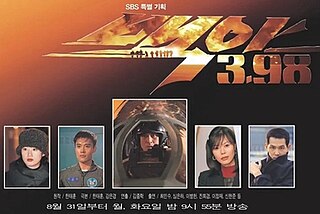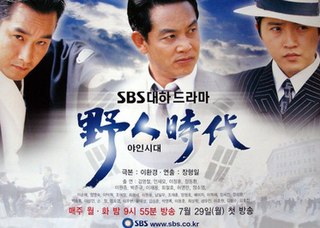Related Research Articles

South Korea competed as Korea at the 1992 Summer Olympics in Barcelona, Spain. 226 competitors, 154 men and 72 women, took part in 134 events in 24 sports.
Seoul Institute of the Arts is a prominent educational institution specializing in the Arts located in Ansan, Gyeonggi Province, South Korea. The school has nurtured many graduates who are actively working in art related fields within Korea as well as internationally. The Namsan campus in the heart of Seoul is used for presentation of arts productions and convergence with industry. The Ansan Campus opened in 2001 and is used for educational training, which aims to tear down barriers between disciplines, genres, and majors. The Institute continues to be a forerunner in globalization of Korean arts and creation of new forms of arts.

Empress Myeongseong is a 2001 and 2002 South Korean television series that aired on KBS2.

The Great King, Sejong is a 2008 South Korean historical television series depicting the life of the fourth monarch of Joseon, Sejong the Great. Considered one of the greatest kings in Korean history, Sejong created Hangul, the Korean alphabet. The series aired on KBS from January 5 to December 7, 2008, on Saturdays and Sundays at 21:30 for 86 episodes. Episodes 1 to 26 aired on KBS1, and episodes 27 to 86 aired on KBS2.

The South Korea men's national volleyball team represents South Korea in international volleyball competitions and friendly matches, governed by Korea Volleyball Association. The Republic of Korea (ROK) has competed in the Olympic Games eight times, but has not featured since the 2000 Olympic Games in Sydney, Australia. The national team's best performance at the Olympic Games was 5th place at the 1984 Games in Los Angeles, California, United States. The national team at the FIVB World Championship competed nine times, with their best result at 4th place in 1978. On continental level, The national team won three gold medals at the Asian Games in 1978, 2002 and 2006. And at the Asian Championship, the national team won four gold medals, two of these was at home in 1989 Seoul and 2001 Changwon and the other two are in 1993 and 2003. The national team now ranks 30th in the FIVB World Rankings and their current head coach is Im Do-heon.

South Korea participated in the 2006 Asian Games in Doha, Qatar on 1–15 December 2006. South Korea ranked 2nd with 58 gold medals in this edition of the Asiad.

White Nights 3.98 is a 1998 South Korean television series based on the novel of the same title by Han Tae-hoon. It aired on SBS from August 31, 1998 to November 3, 1998.

The Quiz Show Scandal is a 2010 South Korean film. The ensemble comedy satire is written and directed by Jang Jin.
KPlus is a South Korean model and actors management company established by fashion model-turned-CEO Go Eun-kyung in 2008.

Jang Yeong-sil (Korean: 장영실) is a 2016 South Korean historical drama television series starring Song Il-kook, Kim Yeong-cheol, Kim Sang-kyung and Park Sun-young. It replaced The Jingbirok: A Memoir of Imjin War and aired on KBS1 from January 2, 2016 to March 26, 2016 on Saturdays and Sundays at 21:40 (KST) for 24 episodes.

The Master of Revenge is a 2016 South Korean television series starring Chun Jung-myung, Jo Jae-hyun, Jeong Yoo-mi, Lee Sang-yeob and Gong Seung-yeon. It aired on KBS2 from April 27, 2016 to June 30, 2016 on Wednesdays and Thursdays at 21:55 for 20 episodes, replacing Descendants of the Sun.

Flowers of the Prison is a 2016 South Korean drama television series starring Jin Se-yeon, Go Soo, Kim Mi-sook, Jung Joon-ho, Park Joo-mi, Yoon Joo-hee, Kim Soo-yeon, Jun Kwang-ryul and Choi Tae-joon. It is MBC's special project drama to commemorate the network's 55th-founding anniversary. The drama also marks the 3rd time collaboration between director Lee Byung-hoon and writer Choi Wan-kyu, after Hur Jun and Sangdo. It replaced Marriage Contract and aired on MBC every Saturdays and Sundays at 22:00 (KST) for 51 episodes from April 30 to November 6, 2016.

Rustic Period (Korean: 야인시대) is a South Korean television series aired from July 29, 2002, to September 30, 2003, on SBS. It focused on the life of historical figure Kim Du-han, a former mob leader turned politician, and the tumultuous modern history of Korea from the Japanese occupation to Park Chung-hee regime.

The Dawn of the Empire is a South Korean historical television series which aired on KBS1 from March 2, 2002 to January 26, 2003 for 94 episodes every weekend at 21:45 (KST). It's KBS' second histocal series set in Goryeo after Taejo Wang Geon and revolves around the reigns of the second, third and fourth king of Goryeo, particularly on the latter, Gwangjong's.
References
- ↑ Apart from working as a poet, dance critic, and painter, Kim Youngtae also actively worked as a music and theatre critic. He first began his career as a critic as a music critic. He was enormously interested in classical music and had a collection of over 1,400 LPs. In 1967, he established a music fan club organization and actively participated in addition to writing his own collection of music criticism. In 1966, he participated in the Jayu geukjang (Freedom Theatre) collective and was active as a theatre critic for around ten years. See the Naver Encyclopedia of Korean Culture’s entry on Kim Youngtae. https://terms.naver.com/entry.nhn?docId=2459866&cid=46666&categoryId=46666 Lee, Junsam, and Juyeong Lee. “Kim Youngtae: A ‘Full Range Artist’ That Encompasses Diverse Genres.” Yonhap News, 12 July 2007. https://news.naver.com/main/read.nhn?mode=LSD&mid=sec&sid1=103&oid=001&aid=0001694234